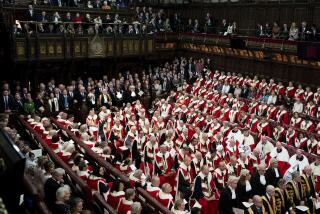Britain to vote on electoral system overhaul
- Share via
Reporting from London — The British government is set to give voters a chance next May to overhaul the country’s electoral system, fulfilling a key pledge by the ruling coalition that came to power two months ago, news reports here said Friday.
A national referendum will ask voters whether they want to jettison the longtime “leader-takes-all” method of electing members of Parliament in favor of a more proportional method that could permanently change the face of British government.
Such a system, allowing voters to make first and second choices when they vote, would boost smaller parties and make coalition governments more likely, breaking up the longtime Labor-Conservative duopoly.
A formal announcement of the referendum is expected next week, but officials began leaking the information late Thursday.
Revising the electoral system is a core issue for the Liberal Democrats, the junior partner in the new Conservative-led government. Britain’s perennial “third party” has long contended that the current voting system unfairly handicaps it in elections, and insisted on a referendum as a condition of joining the Tories in a coalition that knocked the Labor Party out of power after 13 years.
Despite his personal opposition to any change, Prime Minister David Cameron acceded to the Liberal Democrats’ demands to hold a plebiscite.
A spokesman for the prime minister told reporters Friday that Cameron would campaign against the measure once it goes before the public, putting him at odds with his own second-in-command, Deputy Prime Minister Nick Clegg, the leader of the Liberal Democrats.
The Conservatives say there is no reason to tinker with a system they say has served Britain well for decades. Under the present electoral system, known colloquially as “first past the post” or “winner takes all,” whoever receives the most votes — not necessarily a majority —in a district wins that seat in Parliament.
That has tended to skew elections in favor of the two big parties, whose supporters are clumped together geographically, Labor in the north, the Conservatives in the south.
For the Liberal Democrats, whose support is more evenly spread throughout the country, it has resulted in much smaller representation in Parliament than their overall vote totals might otherwise earn. In the election two months ago, the party drew 23% of the vote nationally and landed 57 seats in the House of Commons; by contrast, Labor garnered 29% of the votes cast and won 258 seats.
The proposed system to be offered up in the referendum would allow voters to list their second choice on the ballot. If no candidate wins by an outright majority on first count, the lowest vote-getter’s votes are distributed according to the second-choice preference on his ballots.
If that also fails to produce a winner by outright majority, the process is repeated, using the second-choice votes of the next lowest vote-getter, and so on until one candidate emerges with more than 50% of the vote.
Daniel Kawczynski, a Conservative lawmaker who chairs a committee devoted to keeping first-past-the-post, said the proposed system would create “two classes of voters, which is simply unacceptable.”
“There are millions of Britons out there, like me, who have one preference…. We will be voting once, and yet other people will be given a second vote,” Kawczynski complained to the BBC.
The referendum represents a compromise not just by the Conservatives but also by the Liberal Democrats, who had pushed for an even more proportional system.
Still, for party leader Clegg, unveiling the referendum Tuesday should offer a bit of a political boost.
Clegg is under fire from some of his party’s rank and file, who had been skeptical of joining forces with the Tories and have angrily watched him give in to Tory plans to make drastic cuts in public spending, something the Liberal Democrats campaigned against.
Announcing a referendum on electoral reform allows Clegg to show that his party’s agenda has not been totally trampled on by his senior partners in government.
The Labor Party, which is still without a new leader, has not said whether it would instruct members to support or oppose the proposed reform.
More to Read
Sign up for Essential California
The most important California stories and recommendations in your inbox every morning.
You may occasionally receive promotional content from the Los Angeles Times.













